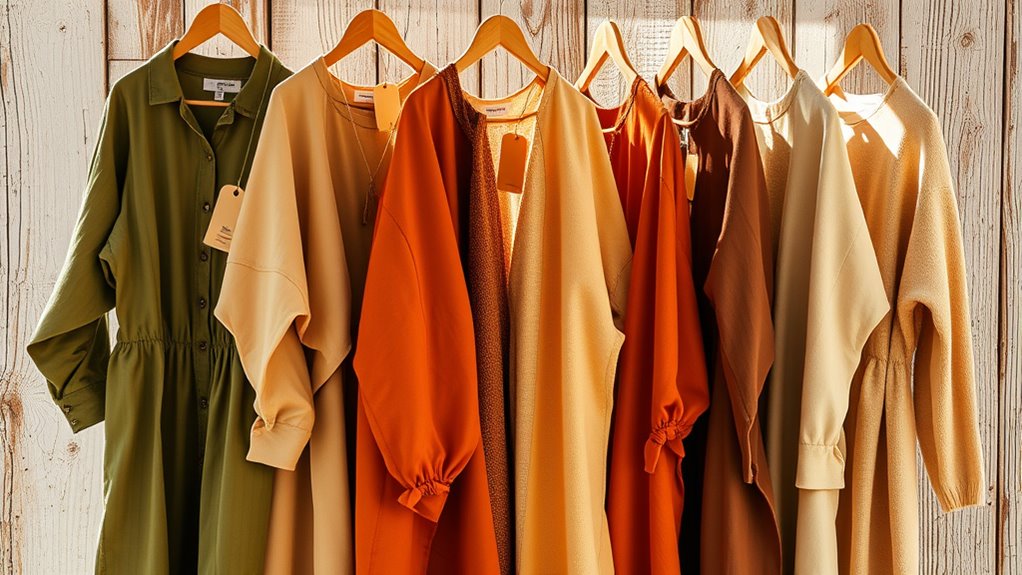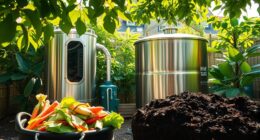If you're looking to support sustainable fashion brands, you can't go wrong with Pact for organic cotton and fair labor, Navygrey for timeless knits and a transparent supply chain, or Maggie Marilyn who's B Corp certified. Everlane champions transparency, while Allbirds focuses on natural materials. Saitex Denim features recycled materials for eco-friendly denim, and Tentree makes a significant environmental impact by planting trees. Stick around to discover more about these incredible brands and their initiatives.
Key Takeaways
- Pact focuses on organic cotton and Fair Trade practices, ensuring ethical labor and community support while promoting sustainable fashion.
- Allbirds prioritizes renewable materials like TENCEL and Merino wool, minimizing environmental impact and investing in renewable energy technologies.
- Saitex Denim utilizes a closed-loop water system, significantly saving water and reducing CO2 emissions through energy-efficient practices and recycled materials.
- Navygrey produces timeless knitwear with a zero-waste approach, emphasizing local sourcing and achieving B Corp certification for sustainable practices.
- Tentree aims to plant 1 billion trees by 2030, using eco-friendly materials and promoting circular business models to combat waste and CO2 emissions.
Pact: Committed to Organic Cotton and Fair Labor

Pact is on a mission to make sustainable fashion accessible by focusing on organic cotton and fair labor practices.
By using organic cotton, you're choosing softer, more durable clothing that's better for the environment compared to conventional cotton. This material reduces pesticides and synthetic fertilizers, promoting eco-friendly agriculture.
Pact's commitment extends to fair labor, ensuring workers earn living wages and work in safe conditions through Fair Trade certification. You'll appreciate that Pact's factories meet high ethical standards, allowing workers to benefit from premiums that support community projects.
With transparency in sourcing and production, you can feel good about your purchases. Whether it's underwear or baby clothes, Pact delivers quality while prioritizing sustainability and social responsibility.
Navygrey: Timeless Knits With a Transparent Supply Chain

As you explore the world of sustainable fashion, Navygrey stands out with its commitment to timeless British knitwear and a transparent supply chain. Founded in 2019, this brand specializes in luxury pieces crafted from soft natural materials like wool and cotton. Oak is known for its strength and durability, which is similar to the enduring quality of Navygrey's offerings. Most of their garments are made in the British Isles, ensuring local sourcing and ethical practices. Navygrey implements zero-waste techniques, produces in limited batches, and uses solar power in its Devon hub to reduce carbon emissions. AI technologies can further enhance sustainable practices by optimizing supply chains and minimizing waste. Additionally, their focus on ethical practices aligns with a growing trend towards accountability in fashion. Smart toilets, for instance, incorporate intelligent water level detection to promote sustainability in everyday life.
Their packaging is crafted from recycled materials, and they prioritize worker well-being throughout their supply chain. By achieving B Corp certification in 2023, Navygrey solidifies its dedication to sustainability, making it a brand you can feel good about supporting. Moreover, their approach exemplifies how sustainable living can be both stylish and responsible.
Maggie Marilyn: B Corp Certified for Sustainability

Maggie Marilyn stands out in the sustainable fashion landscape, not just for its stylish designs but also for its commitment to responsible practices.
As a B Corp certified brand, it scored an impressive 109 on the B Impact Assessment, joining over 4,700 companies worldwide. The brand goes above and beyond by offsetting its greenhouse gas emissions by 125%, earning a CarbonZero certification.
With over 90% of purchases featuring third-party environmental certifications, you can trust that Maggie Marilyn prioritizes responsible materials and sustainable manufacturing. Additionally, the brand exemplifies environmental innovations through its use of innovative fabrics and regenerative agriculture to support local economies through spending, making a significant social and environmental impact. Furthermore, Maggie Marilyn is part of a growing movement among sustainable brands that are dedicated to eco-friendly practices and materials. Moreover, the fashion industry is increasingly recognizing the importance of energy efficiency to minimize its environmental footprint. Notably, the fashion industry is increasingly recognizing the importance of sustainable sourcing to minimize its environmental footprint. Supporting brands like Maggie Marilyn aligns with the rising consumer trend towards clean beauty that emphasizes non-toxic ingredients. When you choose Maggie Marilyn, you're supporting a fashion brand that genuinely cares.
Everlane: Transparency in Manufacturing Processes
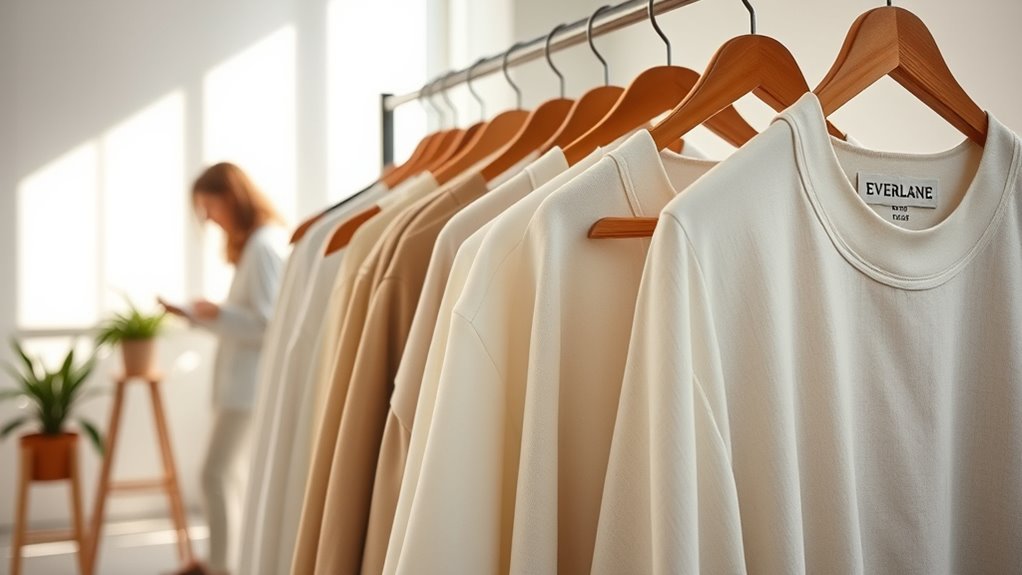
While Maggie Marilyn exemplifies a commitment to sustainability through its innovative practices, Everlane takes a different approach by prioritizing transparency in its manufacturing processes.
Founded in 2010, Everlane's "Radical Transparency" policy allows you to know the factories, costs, and ethical practices behind each garment. They partner with 17 factories across seven countries, ensuring worker safety and fair wages. This commitment to transparency also reflects the importance of ethical guidelines in responsible sourcing and production practices. Additionally, understanding IRA inheritance rules can help investors make informed decisions about their financial future while supporting sustainable fashion. The tea industry has also seen a growing demand for sustainable products, reflecting a broader consumer trend toward eco-conscious choices. Furthermore, many consumers are increasingly prioritizing products with antioxidant benefits that contribute to overall health.
You can also trace the journey of your clothing, as Everlane openly shares its supply chain details. Committed to eliminating virgin plastics, they focus on using recycled materials and sustainable fabrics. By mastering interior design techniques, brands like Everlane can create eco-friendly showrooms that align with their sustainable values.
With a mission to provide transparent pricing, Everlane not only attracts eco-conscious consumers but also sets new standards for transparency in the fashion industry.
Allbirds: Natural and Renewable Materials
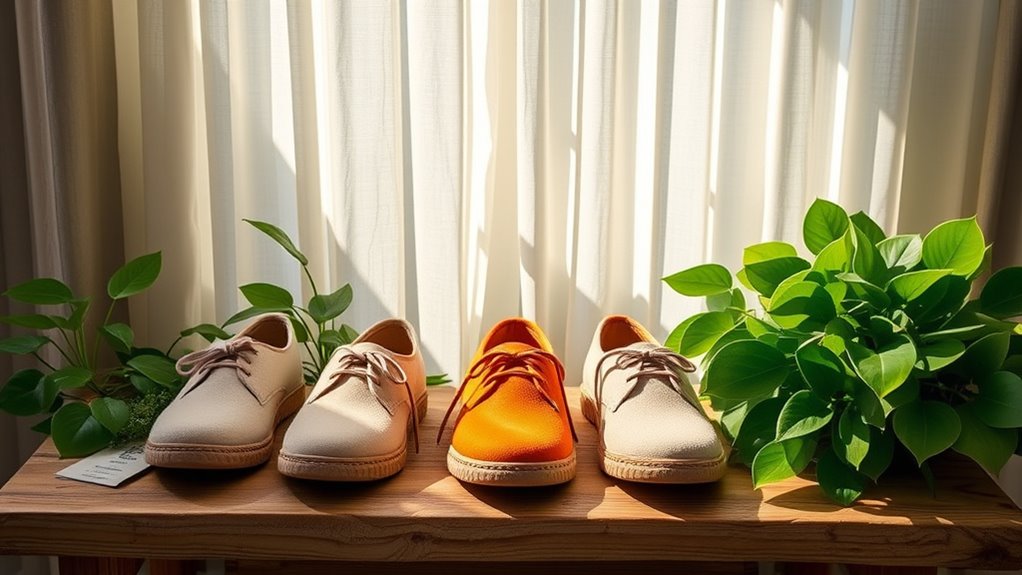
Allbirds is revolutionizing the footwear industry by prioritizing natural and renewable materials in its products.
You'll find TENCEL Lyocell sourced from South African wood, significantly reducing water and carbon impact. Their Trino and TrinoXO yarns combine eucalyptus fibers and Merino wool for ultimate comfort. Additionally, their choice of materials aligns with the sustainable eating habits encouraged in various industries, including fashion. Foraging behavior in various species highlights the importance of resource selection, similar to how Allbirds selects sustainable materials for its products. Furthermore, the use of natural materials can help promote healthy ecosystems, which are essential for maintaining biodiversity.
SweetFoam, made from sugarcane, offers a sustainable sole alternative. Plus, their plant leather is a 100% natural, plastic-free option.
Allbirds' commitment doesn't stop there; they use carbon-negative green EVA to further cut emissions. By transforming recycled plastic bottles into shoelaces, they tackle waste efficiently. Additionally, Allbirds' investment in renewable energy technologies aligns with their mission to minimize environmental impact and encourage sustainable practices across various sectors.
With goals to rely on renewable energy and implement regenerative practices, Allbirds is setting a standard for sustainability in the fashion industry that you can feel good supporting. Healthy ecosystems are essential for maintaining biodiversity and can benefit from sustainable practices in various industries, including fashion.
Saitex Denim: Recycled Materials for Sustainable Denim
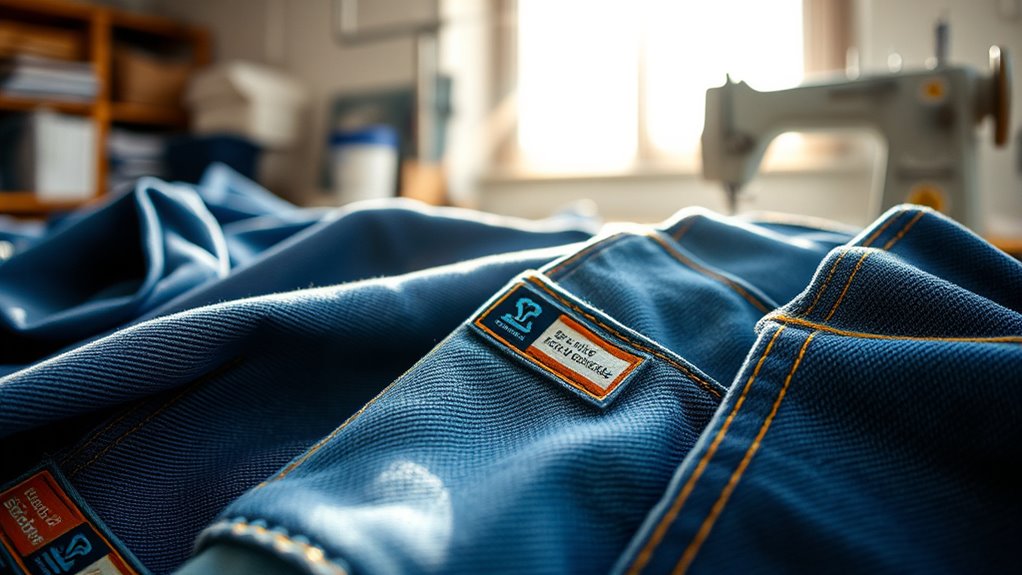
Building on the commitment to sustainability seen in brands like Allbirds, Saitex Denim is making waves in the denim industry with its innovative approach to environmentally friendly manufacturing.
Based in Vietnam, Saitex uses a closed-loop water system that recycles about 98% of water, saving more than 22 gallons per pair compared to traditional methods. Their focus on recycled materials, like organic cotton and Smart-Indigo technology, drastically reduces CO2 emissions by 90% during dyeing. Additionally, good grief emphasizes the importance of emotional processing, which can be likened to the emotional investment consumers make when choosing sustainable products. Financial considerations for environmentally friendly manufacturing are crucial for long-term sustainability, as they can enhance inflation protection for consumers investing in sustainable products.
Additionally, Saitex implements energy-efficient machinery and solar panels, saving over 13 million kWh annually. Through the REKUT program, they also provide training and employment opportunities to marginalized groups, ensuring ethical labor practices. Furthermore, adopting sustainable practices in manufacturing can help mitigate the environmental impacts associated with traditional production methods.
With Saitex, you're supporting a brand committed to social and environmental responsibility.
Tentree: Environmental Impact Through Tree Planting

Tentree is on a mission to plant 1 billion trees by 2030, making a significant impact on the environment with every purchase you make.
They've already planted over 105 million trees, absorbing more than 9 million tons of CO2 and restoring habitats for countless species.
With a commitment to sustainability, Tentree uses eco-friendly materials like organic cotton and recycled polyester while promoting circular business models. Proper sealing mechanisms in their production process contribute to reducing waste and enhancing product longevity. Additionally, their practices align with renewable energy sources, promoting a greener manufacturing approach. Airless paint sprayers, for instance, efficiently utilize adjustable pressure settings to optimize paint usage and minimize waste. They also prioritize energy-efficient options, which help reduce the overall environmental impact of their production.
Their B Corp certification showcases transparency and accountability in their operations.
You can even track your environmental impact through their Impact Wallet.
By choosing Tentree, you're not just getting stylish clothing; you're actively contributing to job creation and community empowerment through reforestation efforts worldwide.
Additionally, supporting brands that prioritize sustainable materials helps drive demand for eco-friendly practices in the fashion industry.
Your choices can help shape a greener future.
Frequently Asked Questions
How Do These Brands Ensure Ethical Labor Practices?
These brands ensure ethical labor practices by prioritizing safe working conditions and offering living wages that meet local standards.
They comply with regulations and empower workers through training and support initiatives.
By partnering with organizations for certifications and transparency reports, they maintain accountability.
Additionally, they collaborate closely with suppliers to uphold ethical standards, ensuring that you can trust their commitment to fair labor practices when making your purchasing decisions.
What Is the Environmental Impact of Their Production Processes?
Imagine purchasing a t-shirt made from organic cotton, knowing it used 90% less water than conventional methods.
The environmental impact of production processes is significant. By utilizing eco-friendly materials and energy-efficient techniques, brands minimize carbon emissions and reduce water pollution.
They often incorporate circular fashion principles, extending garment lifecycles through recycling and upcycling. This approach not only conserves resources but also lessens textile waste, creating a healthier planet for future generations.
Are the Materials Used in These Brands Biodegradable?
Yes, many materials used in sustainable fashion brands are biodegradable.
You'll find options like compostable silk, organic cotton, hemp, and bamboo that decompose naturally. Brands often utilize natural dyes and plant-based fabrics, ensuring minimal environmental impact.
Innovative materials like mycelium-based leather alternatives and biodegradable packaging also contribute to this eco-friendly approach.
How Can I Verify a Brand's Sustainability Claims?
To verify a brand's sustainability claims, start by researching their practices through their website and independent reports.
Check the materials they use, ensuring they're sustainable. Look for transparency in their production processes and any third-party certifications.
Be cautious of vague or misleading claims, and verify any certifications through the certifying organization's site.
Finally, use consumer tools like Good On You to get a clearer picture of their sustainability efforts.
What Certifications Should I Look for in Sustainable Fashion?
Did you know that only 1% of the world's textiles are recycled?
When looking for sustainable fashion, focus on certifications like GOTS for organic materials, Fair Wear Foundation for fair labor, and Bluesign for environmental responsibility.
These certifications ensure that brands prioritize ethical practices, responsible manufacturing, and eco-friendly materials.
Conclusion
When you choose to support these sustainable fashion brands, you're weaving a tapestry of change, thread by thread. Each purchase isn't just a transaction; it's a step toward a greener planet and fairer labor practices. By embracing their commitment to the Earth, you're planting seeds of hope, watching them bloom into a brighter future. So, wear your values proudly and let your style speak volumes in the language of sustainability. Together, we can make a difference.
